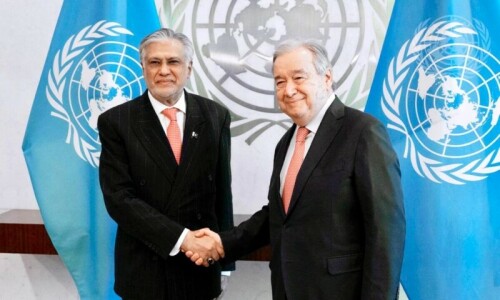PAKISTAN continues to pay a heavy price in the fight against terrorism. Three attacks were witnessed in different parts of KP and Balochistan within hours of each other on Friday, and then a fourth in Punjab in the early hours the next day.
A police convoy came under an IED attack in KP’s Dera Ismail Khan, leading to the deaths of five passers-by and injury to 24 others. In another bomb attack in a border town between Tank and D.I. Khan, which targeted a convoy of police and security forces, one soldier was martyred.
In Balochistan’s Gwadar, an ambush on two security vehicles martyred 14 army soldiers — the year’s deadliest attack on the military. Separately, two soldiers were martyred in a military operation in Lakki Marwat. While the country was still reeling from these incidents, a training air force base in Mianwali came under attack before dawn. The military said the incursion was successfully thwarted, that nine terrorists were killed and the only damage was to a fuel tanker and three grounded aircraft. In all, 17 soldiers were lost to this most recent spate of violence.
The Mianwali airbase attack has been claimed by the TTP-linked Tehreek-i-Jihad Pakistan, which was responsible for the last high-profile attack on the military in Zhob this July. The banned TTP is most likely the culprit in D.I. Khan, having stepped up its operations against security forces since a ceasefire agreement came to an end last November.
Fears abound of the insurgents fully regrouping, emboldened by the Afghan Taliban’s takeover of Kabul in 2021. Unverified photos circulating after the airbase attack show American weapons were seized, which likely fell into the TTP’s hands after the US troops’ Afghanistan withdrawal. Although the Taliban deny it, most official and independent assessments indicate the TTP uses Afghan soil and has the new government’s backing. The Gwadar ambush was claimed by the banned Balochistan Liberation Front.
The attacks have occurred as Pakistan carries out its repatriation plan for Afghans, which has been met with anger in Kabul. Our security apparatus will need to remain extra vigilant and flush out not just the militants but also their facilitators. We must comprehensively implement the National Action Plan against militants of all stripes, and identify and cut off financial streams that support terrorists. Border security must be strengthened.
In the case of the TTP, our efforts would need to take into account the complex dynamics of the regions where it operates, as well as the broader geopolitical implications, including ties with Kabul. The state must invest in the socioeconomic development of areas that are breeding grounds for such militant groups. Until we address the root causes, militants will continue to maintain the recently witnessed momentum of their nefarious activities.
Published in Dawn, November 5th, 2023
















































Dear visitor, the comments section is undergoing an overhaul and will return soon.